Cruelty Squad and the Meaning of Meaninglessness
The Philosophy of the World's Most Hideous Game, Part II
On account of the growing servility of intellectual forms within us, it has fallen upon us to perform a deeper sacrifice than those of the men who preceded us.
Georges Bataille, 1954
INTRODUCTION
Last time, we charged headlong through the Minotaur’s Labyrinth of 2021’s Cruelty Squad and came out the other side with our perspectives greatly broadened, if a bit sore. This week, we’re diving back into the turbid retention pond of post-structuralist social theory and examining the game’s deeper themes and philosophical entreaties as I understand them.
I promised minimal spoilers for last week’s overview, but I make no such guarantee for the newsletter you’re about to consume. I’m not gonna give away the entire plot or spell out every pastiche, but I’m gonna trust you to set this one aside for the time being if you still want to experience Cruelty Squad as the Sun intended, i.e., mostly blind. Sound good?
Cool, then here’s the plan: first, we’ll have ourselves a high-level look-see at the philosophy that Cruelty Squad most prominently name-drops, i.e., that of Georges Bataille. Then, after we’ve filled in the gaps from last week, we’ll synthesize everything we’ve discussed into my interpretation of Cruelty Squad’s ultimate message. Buckle in, pals!
WHY? BATAILLE, MY GUY!
Georges Bataille (“buh-TYE” sounds close enough) was a French philosopher-poet whose work influenced all manner of post-modern theoreticians and, by extension, many of today’s antiestablishment creatives. He was a good friend and by-and-by mentee of the Russian anti-philosopher Lev Shestov, whom you may remember from our last foray into Cruelty Squad. And like Shestov, he conceived of “complete understanding,” “systematized logic,” and similar horseshit as clownish vanity. To Shestov and Bataille, philosophy — and, by extension, knowledge — is a boundless sea that humanity will never comprehensively chart, and so the purpose of philosophy at any given time is to create meaning and purpose beyond the present. Or, in more pragmatic terms: to philosophize is to think beyond the limits of what is known in order to create new and productive thought that meets the World-Historical moment.
This may seem a very abstract conception of reality to the terminally online Westerner, so let’s compare it to today’s market-based approach to rationality. If you’re old enough, think back to the cell phone you had in the Summer of 2006 — it could make and receive calls, and you could just about compose a text message if you had several minutes to spare for typing it with a T9 keypad. Maybe you had a BlackBerry and could even browse those awful first-generation mobile websites. My own recollection is that it all worked out just fine: the world ran smoothly enough, and nobody was clamoring for 4K OLED displays or telephoto camera lenses.
Point is, if Steve Jobs hadn’t thought beyond the accepted vogue and released the iPhone the following Summer, we’d have gone on using our flip-phones without a second thought until some other disruptive sperg brought the smartphone to market. In short: those who do not philosophize cannot be expected to innovate, because innovation is the opposite of continuity. Bataille warns us that those who philosophize have an easy time manipulating the beliefs and behavior of those who don’t, because to be uncritical of one’s circumstances necessarily implies acceptance of those circumstances.
Relatedly, Bataille critiqued humankind’s “Hunger for Solidity,” his term for the pursuit of comfort or stability as a precondition to the pursuit of a life worth living. In other words, he was pissed off by the instinct to say “I’ll pursue my dreams once I have a stable and high-paying job to support myself.”
“No, jackass,” snaps Bataille. “Did Shia LaBeouf teach you nothing? You’re supposed to get up and just do it.” For Georges, the search for material stability will always run up against the base insufficiency of Being — no life is ever truly “complete,” so there’s no point in passively awaiting some illusory wholeness. If you could become whole by simply following your society’s expectations for you, then you wouldn’t desire creative self-fulfillment in the first place. I notice that many folks, myself included, had some form of this realization before starting a Substack newsletter.
But Bataille didn’t have that option, so his proposed intervention was to construct “relatively stable wholes” like gods and empires under which our human insufficiencies could be a feature instead of a bug. As I understand it, the idea is that aggregating under lofty signifiers like these creates permission to abandon rationality and conformity. In theory, that abandonment should cause our ideological levees to break, resulting in a biblical flood of imagination and creativity. A promising strategy, since there would seem to be no way of extricating ourselves from our irrational surroundings. Cruelty Squad ceaselessly bludgeons the player with this theme, populating its world with psychologically desolate characters whose every action is either pitifully apathetic or else violently psychotic. Folks cope in their own ways, because there’s no way out.
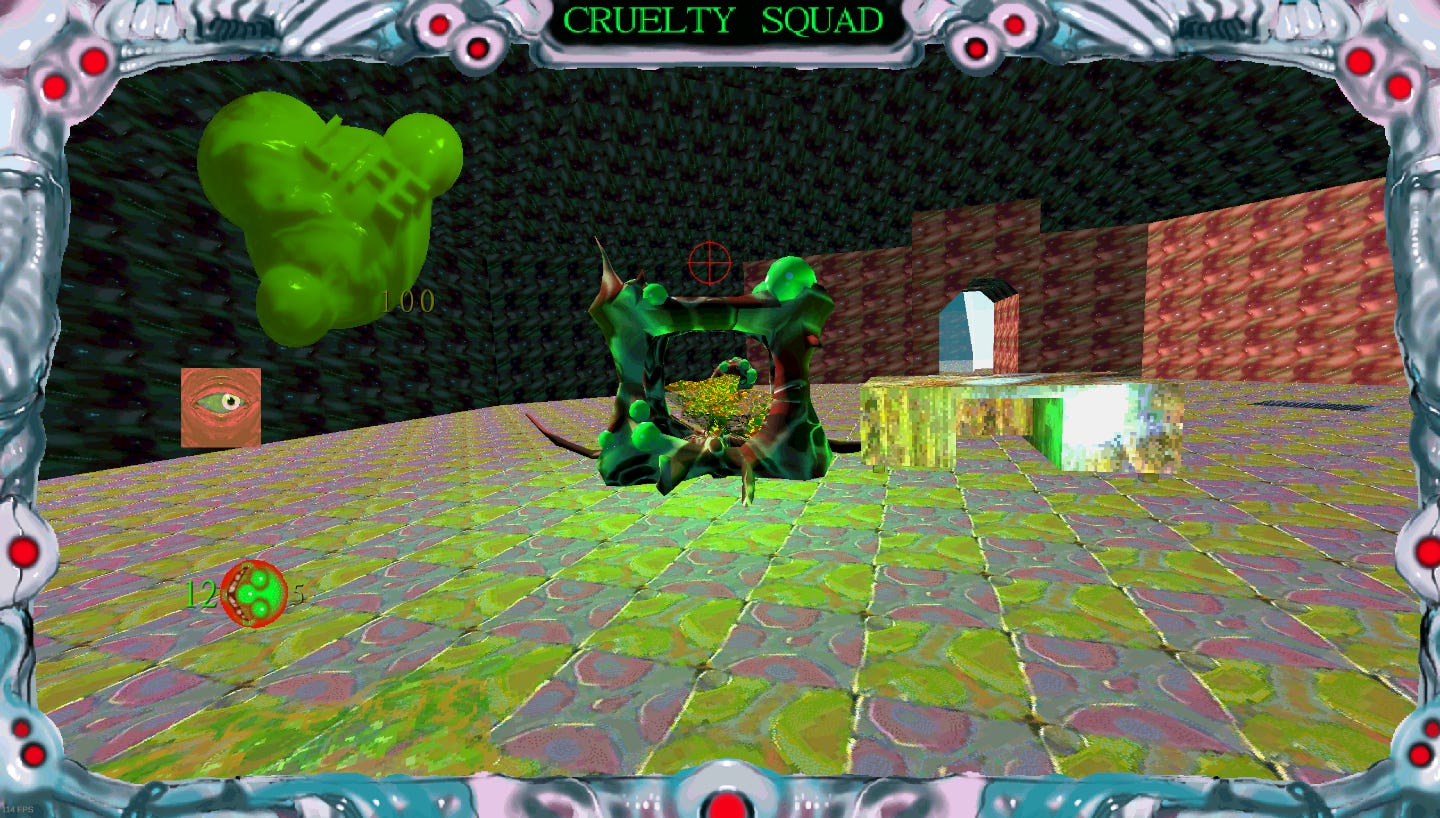
Well, except DEATH, of course. But Cruelty Squad’s notion of death is a bit more complicated than the classic version to which we’re accustomed. We’ll come onto that later — let’s build up to it with a refreshing discussion about putrefaction and decay.
THE ACCURSED SHARE: DEATH BY A THOUSAND GUTS
Now that we’re two newsletters and several thousand words into my Cruelty Squad interpretation, I suppose we can finally acknowledge the solitary moment of narrativization that actually is unmistakably philosophical in character. That’d be the very last screen in the game, which prominently displays the following quote attributed to Georges Bataille:
“The living organism, in a situation determined by the play of energy on the surface of the globe, ordinarily receives more energy than is necessary for maintaining life; the excess energy (wealth) can be used for the growth of a system (e.g., an organism); if the system can no longer grow, or if the excess cannot be completely absorbed in its growth, it must necessarily be lost without profit; it must be spent, willingly or not, gloriously or catastrophically.”1
Let’s first break this down with a simple physiological analogy. Suppose you finish a nutty workout and, feeling unusually depleted, you decide to eat a whole tub of protein powder. What happens next? Well, your body will use a portion of it to repair your hypertrophic muscles. But you’ll soon run out of tissue to regenerate, and the leftover metabolites will float around your bloodstream and make you feel like garbage until you either piss ‘em all out (gloriously) or need dialysis (catastrophically).
Cool, how about a nuanced social analogy? Suppose you finish a nutty communist revolution and, feeling unusually bounteous, you quadruple your population over a generation. What happens next? Well, your Interior Department will lodge a portion of the excess folk in brutalist housing projects. But you’ll soon run out of undeveloped land, and the leftover rabble will float around your capital and make you feel like Khrushchev until you either militarily conquer a neighboring republic (gloriously) or get torn to pieces by angry throngs as they storm the palace (catastrophically).
Bataille’s “Accursed Share,” then, is the excess revenue in any transactional economy that can’t be converted into growth or recuperated as profit. Sometimes it’s actual energy, other times it’s a number in a database masquerading as fiat currency. Cruelty Squad, for its part, establishes its vision of free-market capitalism as a kind of hypermetabolic bio-machine, often literally reifying it as writhing lumps of flesh that propagate and metastasize. It’s not a coincidence that the in-game organ market describes the human stomach as “the origin of death,” because the world of Cruelty Squad is itself a tangled body-without-organs that, because of its reckless cycle of overproduction and overconsumption, has become terminally ill.
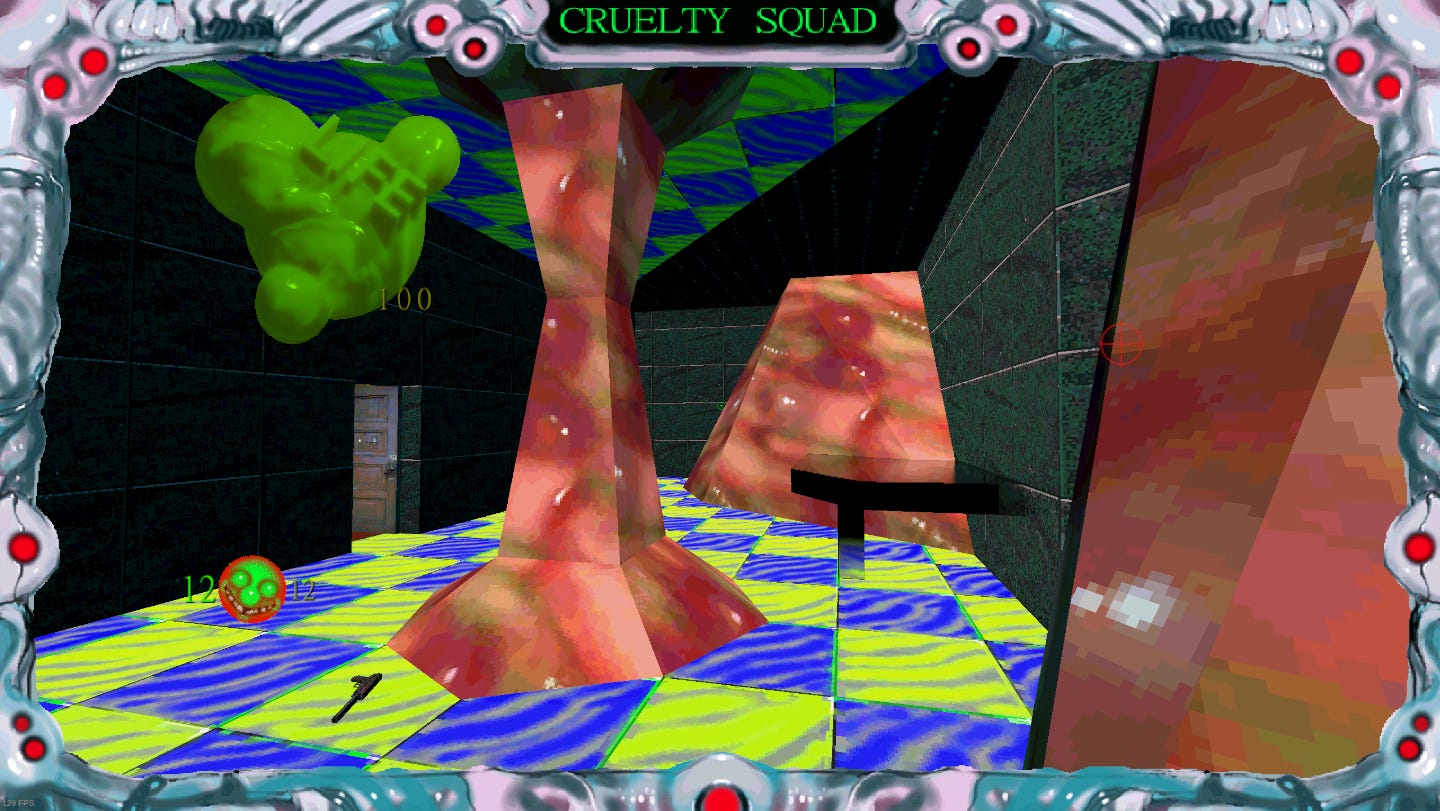
Of course, the harshest cruelty of terminal illness is the horror of slow deterioration, both for the afflicted and for those who rely upon them. In its first and second endings, Cruelty Squad asks you to conceive of the world around you as incurably deteriorated, and to realize that you must suffer as a result, no matter what you do. If that sounds refreshingly Nietzschean, I’d say you’re on the right track. I think Georges and Friedrich would’ve been great friends — or even lovers? — if not for the fact that one was French and the other German.2
Bataille recognized that people tend to desire a feeling of cosmic importance even in societies without organized religion. Taking the human-sacrificial rituals of precolonial Mesoamerican societies as an extreme example, he concluded that sacrifice is ultimately a process of manufacturing that-which-is-sacred for the sacrificers’ consumption. Naturally, this productive process can manufacture non-recuperable excess like any other, which must likewise be wasted one way or another. In a paganist context, this usually implies cool stuff like lavish feasts and orgiastic rites.
Not so in the post-faith universe of Cruelty Squad — in place of gods, Value and Status are worshipped as the highest metaphysical entities. They take the most successful individuals with the highest net-worths as their priests, and then feed on the rest. If you’ve ever spent any length of time whatsoever on LinkedIn, then you may think we’re frightfully close to such an Accursed Share. There is a way out, but you’re not gonna like the sound of it.
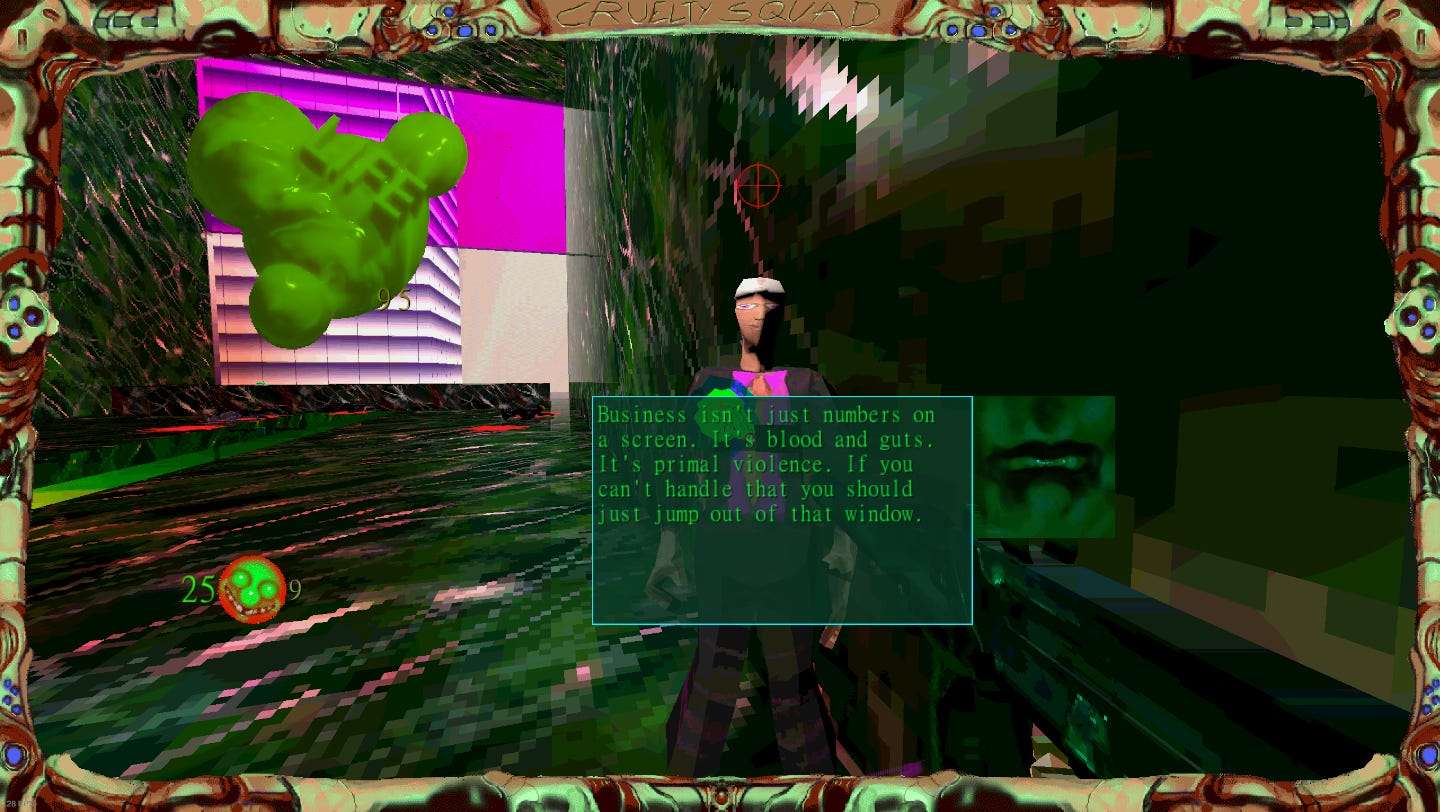
L’ANUS SOLAIRE
The Sun is a constant presence in Cruelty Squad — more so than in real life. Gaze into the sky while outdoors, and you may find it literally staring back at you. And when you die, you get a picture of the Sun in close-up looking simultaneously shocked and disappointed. As in our reality, the Sun is the source of both growth and decay. Its warmth and light are the proximate causes of organic life, but also of excess and putrefaction. While we live, solar energy nourishes and sustains us. After we die, it decomposes and discards us.
The Sun, therefore, is both the gut and the ass of the cosmos. Bataille saw a kind of lurid beauty in this metaphor and gave it poetic voice in his 1927 text L’Anus Solaire. Let me share my favorite part with you:
Disasters, revolutions, and volcanoes do not make love with the stars.
The erotic revolutionary and volcanic deflagrations antagonize the heavens.
As in the case of violent love, they take place beyond the constraints of fecundity.
In opposition to celestial fertility there are terrestrial disasters,
the image of terrestrial love without condition,
erection without escape and without rule, scandal, and terror.3
We’re told to accept that Evil is not inherently constrained by Good. Bad shit happens because death and decay are inextricable counterparts of life and growth. Without death, we couldn’t define life in opposition to its absence, and life would have no worthwhile meaning for the living. You could always choose to assign cosmic value to your existence based on abstract notions of divinity, like I do — problem is, you’re still gonna live in a world in which even the devoutly religious behave as if there was no God. We live in an era where faith and religiosity are, on average, performative at most.
But maybe that doesn’t have to be a bad thing — after all, the absence of a stable source of justice implies the absence of metaphysical constraints on our behavior. The downside is obvious: this creates positive ground for avarice and evil. The upside, however, might just make up for it: we become masters of our own destinies, and we can bend the universe toward our own justice. I guess this is basically the dictionary definition of “doing evil,” but without divine instruction, goodness is only ever in the eye of the beholder. Let’s go ahead and talk about how Cruelty Squad brings this all home.
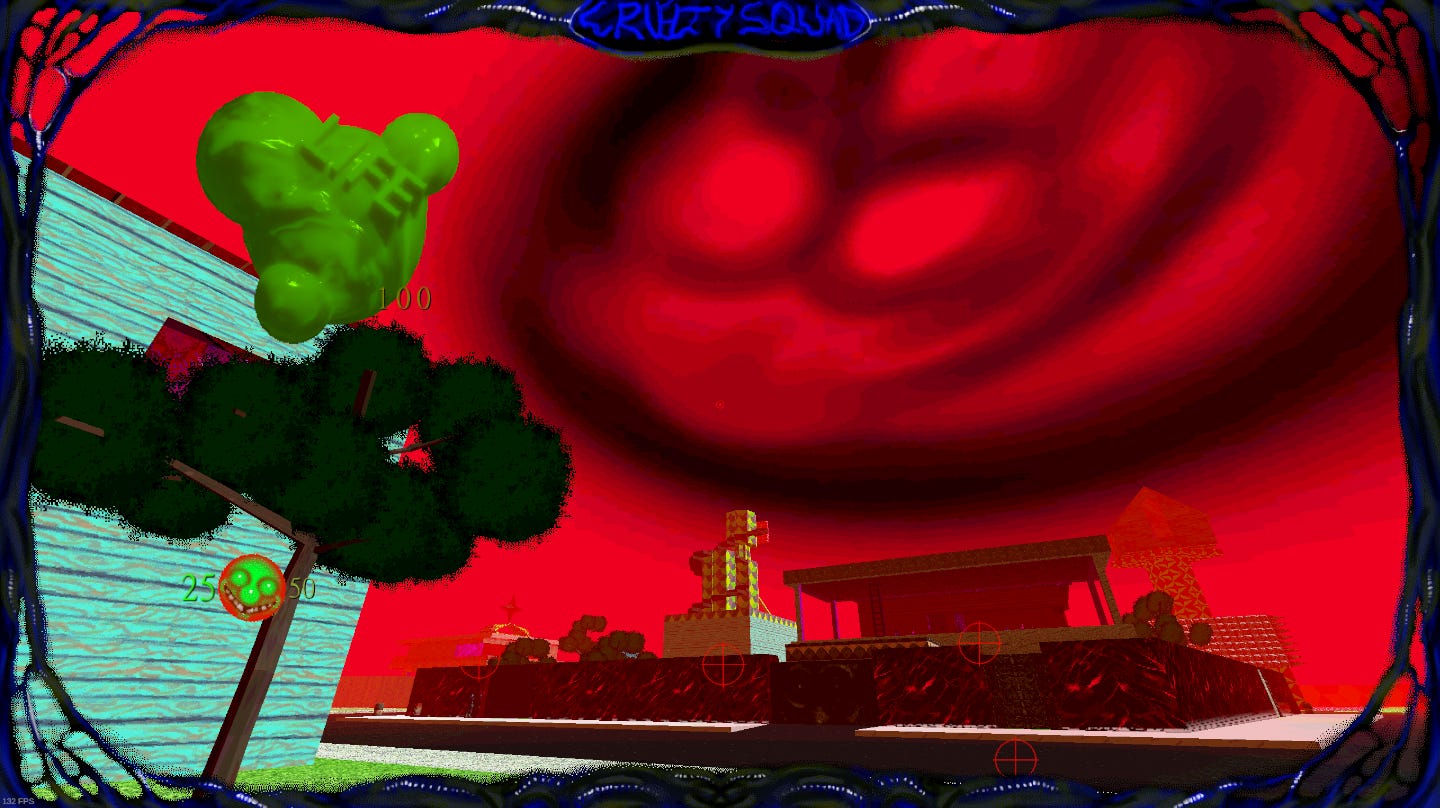
LA MORT ET VOUS
Maximum spoiler threat ahead. Seriously, get off here if you don’t want the very end spelled out.
Enough dicking around. Let’s talk about Trauma Loop and the True Ending. Upon selecting Trauma Loop, the final secret mission, we get Cruelty Squad’s most acutely perplexing mission description. We might as well begin there:
"As a successful member of society with a stable unflinching psyche and limitless drive, natural affinity for finance and domination, you have been selected, no, you have been effortlessly guided by divine (biological) trauma towards this moment. The gates of destiny fling open, and once again you're left standing on pulsating nothingness. A strobing headache of the soul."
This is the mission in which, according to popular theory, the protagonist of Cruelty Squad ascends to Godhood, conquers the universe, and lovingly destroys all life. There’s also an oblique stab at neoliberal capitalism. I’ll be discussing none of that. What most interests me are the two phrases “effortlessly guided by divine (biological) trauma towards this moment” and “standing on pulsating nothingness.” We’re going to discuss each and, once we’re done, I think we should be about ready for Psycho Patrol R at the end of March.
DIVINE (BIOLOGICAL) TRAUMA: PUTREFACTION AS PALLIATIVE
“Effortlessly guided” is straightforward enough. A current can effortlessly guide you down a river, just as a thumb can effortlessly guide you through a newsfeed. But what moment requires the effortless guidance of divine (biological) trauma in order to reach? And given what we know about trauma, how could it be both divine in substance and yet incidentally biological? A riddle for you, then: what incidentally biological trauma feels divine in nature but is effortless to reach?
Ooh, how about DEATH? It takes absolutely no conscious effort to achieve, and maybe it feels divine in nature because no religion on the planet will shut the hell up about it. But there is no religion (as such) in Cruelty Squad, so Death has a commensurately blunter role. When spirituality and other such signifiers of meaning are wholly replaced by the primacy of individuality — or, indeed, by the drive for capital gains — then we as individuals will have no source of cosmic significance aside from our continuous overconsumption of the Sun’s excessive output. Bataille supposed this radical casting-off of our significance could bring humankind closer to a state of transcendant immanence in which we might become our own gods.
And with that as a transition, I suppose we can finally talk about “standing on pulsating nothingness.”
POWER IN MISERY: STANDING ON PULSATING NOTHINGNESS
The end of Trauma Loop and the final cutscene that follows isn’t necessarily my favorite video game ending, but it’s undoubtedly one of the most arresting sequences in any game I have personally played. The goal is deceptively simple at first blush: locate the Cradle of Life. The game doesn’t explain what the Cradle of Life is or why you need to find it, but the observant player will probably arrive at the popular interpretation — after eighteen missions of slaughter and market domination, the protagonist is deified and so seeks to unmake the universe.
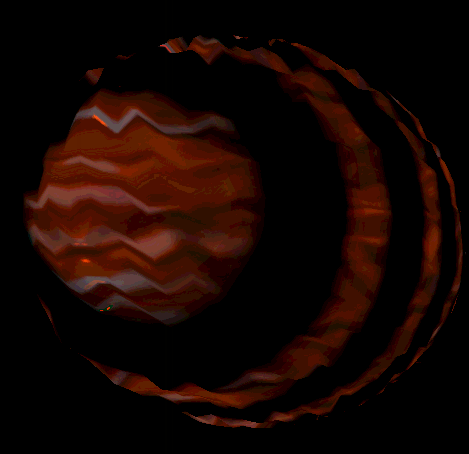
Keep in mind that Trauma Loop is the hardest mission by quite some margin and, unless you’re an absolute whiz, you’ll have spent hours trying and failing to beat it. Your upgrades and special equipment are taken away, and the enemies are more powerful and more numerous than usual. The hardest part of the level, when you’re surrounded on all sides by hard-to-see enemies with pinpoint accuracy, is saved for the very end — most players will fail at the last hurdle, and do so several times.
Consequently, the intended way to experience the game’s True Ending is with hands sweating, heart pounding, and a bloodstream filled with spiteful adrenaline. As you approach the Cradle, more and more of the game’s audio is replaced with buzzing static. You reach it, and the final cutscene plays. The protagonist is shown leading a crowd of people toward their physically embodied Death. The background “music” drops a grating, detuned melody of sawtoothed noise over a bassline that gurgles like an irritable bowel.
And every half-minute or so, we get a paragraph of verse that ties up our nameless protagonist’s story. It’s a darkly satisfying resolution to a deeply abstract narrative. And, if the setting and tone of Cruelty Squad felt personally resonant, then you may find the ending abyssal enough to stare back into you. I’ll leave you for this week with my read of Cruelty Squad’s final moments.
"A point in the horizon, a melting scene from your childhood. Your mortality is showing. A frantic drift towards nothing, biology doomed to an infinite recursive loop. Teeth with teeth with teeth. Take a bite. Serene scent of a coastal town, warmth of the sun. Bitter tears. Lust for power. This is where you abandoned your dreams. You are a high net worth individual, an expanding vortex of pathetic trauma. Finally a beautiful fucking nerve ape. A pure soul is born, its neurotransactions stutter into being. 30583750937509353 operations per nanosecond. Beauty eludes your porous mind.
To lust for power, to cry bitter tears, to at last become a beautiful fucking nerve ape… perhaps this is the American Dream in microcosm. I remember how much of myself I sacrificed as a young man in a vain effort to satisfy others’ impossible expectations, and faded memories of hyperreal agony fill my head. Just like my father and his father before him, I followed the rules and became an expanding vortex of pathetic trauma — just like we were all promised.
"The value of Life is negative. The balance of being is rotated by 38 degrees. The surface is full of cracks, a turgid light shines through. Fleshy primordial bodies sluggishly roll down the slope. Only you slide upwards, with a celestial step. You become beautified, a saintly figure. Your pristine idiocy reveals a safe path through the impenetrable fog of Life. Your dull sword cuts through the weak tendons and membranes of the garden of corruption. Sit on the throne of contentment and ferment. Inspect the eternal blue skies of your kingdom. You come to a realization. You pick up an onion and begin peeling.”
About a year into the pandemic, I decided I’d had enough of debasing myself for a salary and quit my steady corporate IT job, resolving never again to work nine-to-five for the benefit of a corrupt bureaucracy no matter the personal cost. A few months passed, and I came to a realization: I was no longer overwhelmed by stress and anxiety for the present or the future; I was eating healthier and more often even on a fraction of my old grocery budget; and most startlingly of all, I was happy. I watched my peers climb their career ladders and acquire ever more expensive posessions to replace the listless emptiness that grew inside. Meanwhile, I was sat at home even more broke than I am now, and I felt fucking fantastic about it. But how?
"Onion layer one. Onion layer two. Onion layer three. Onion layer n^n. Aeons have passed and the onion is fully peeled. Nothing remains. It's perfect. You get lost in the point that remains where the onion used to be. Synaptic cascade, neurological catastrophe. The point becomes infinitely dense, the universe condenses into a unicellular being. It screams sin. It craves happiness. It's done with this world. It tries to commit suicide but fails. Sad pathetic mess. You feel pity and disgust but in a way only a being of pure grace can. In your violent mercy you terminate the worldlife."
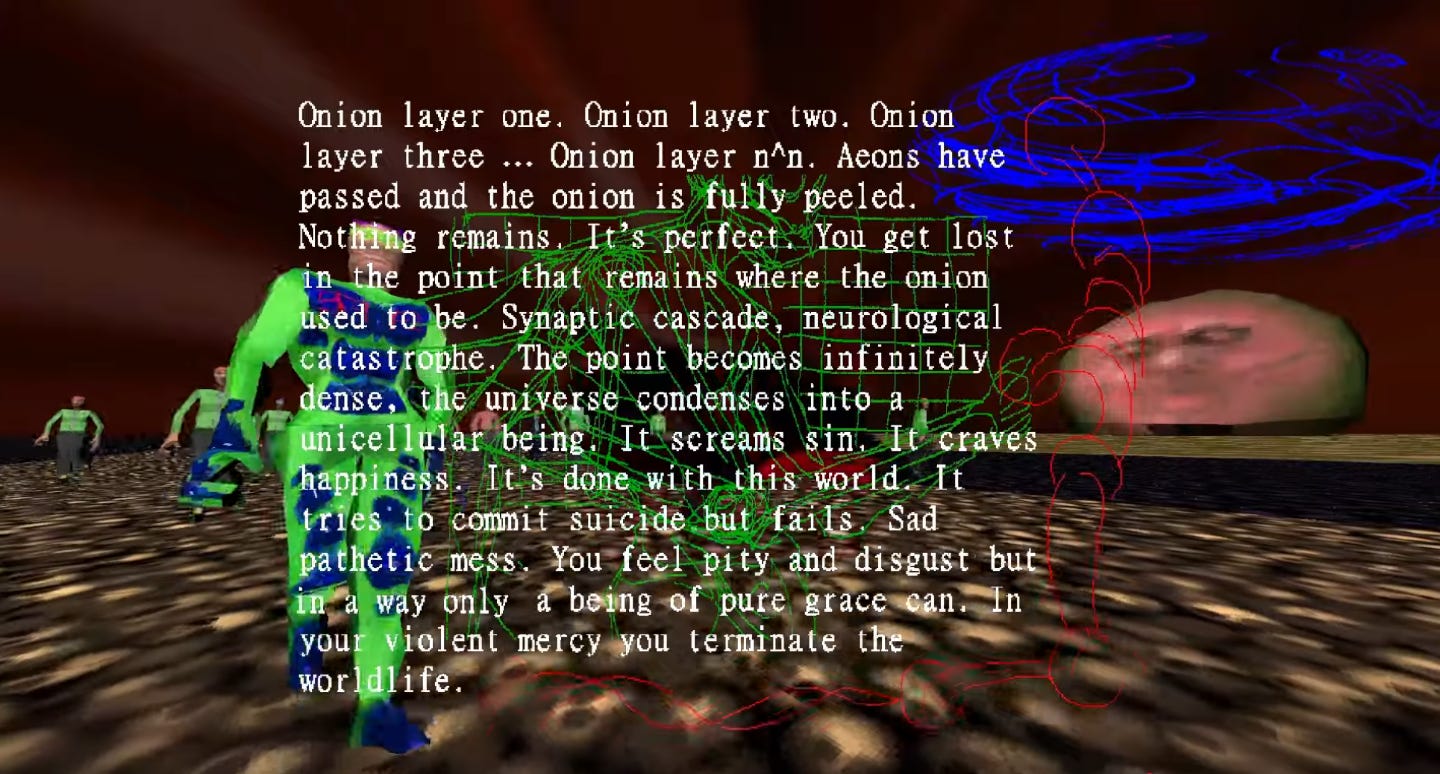
I peeled back the layers of spectacle that obstructed my view of reality. The layer of professional employment gave way to long-term financial solvency, under which I found individuality, then subjectivity. Beneath that I found only a pulsating nothingness that could just about hold my weight. That’s when I decided to stop dignifying the spectacles, the farcical institutions, and the Kaufmanesque satires of justice and divinity. Look around you — doesn’t it seem like the world around us is trying to commit suicide but failing? Do pity and disgust not ferment inside you for this sad, pathetic mess? Cruelty Squad’s message is the same as Bataille’s: we can become beings of pure grace, but not before we terminate this worldlife.
Luckily, we don’t live in the world of Cruelty Squad quite yet, and violence is not a foregone conclusion. Let’s keep it merciful while we still can.
"The living organism, in a situation determined by the play of energy on the surface of the globe, ordinarily receives more energy than is necessary for maintaining life; the excess energy (wealth) can be used for the growth of a system (e.g., an organism); if the system can no longer grow, or if the excess cannot be completely absorbed in its growth, it must necessarily be lost without profit; it must be spent, willingly or not, gloriously or catastrophically. – Georges Bataille”
Til next time, friends <3
I’m directly quoting Cruelty Squad, which itself quotes the following translation: Georges Bataille, The Accursed Share, Volume I, p. 21. Translated by Robert Hurley. Princeton University Press, 1988.
Oh, and I guess Nietzsche died when Bataille was like three. Whatever, it’s my fan fiction and I’ll do with it as I please.
Georges Bataille, Visions of Excess: Selected Writings, 1927–1939. Tr. Allan Stoekl. Theory and History of Literature, Vol 14. University of Minnesota Press, 1985.






Looking forward to reading your analysis, philosophical interpretation and critical examination of Madden NFL 25 next week!
/s
Great read.